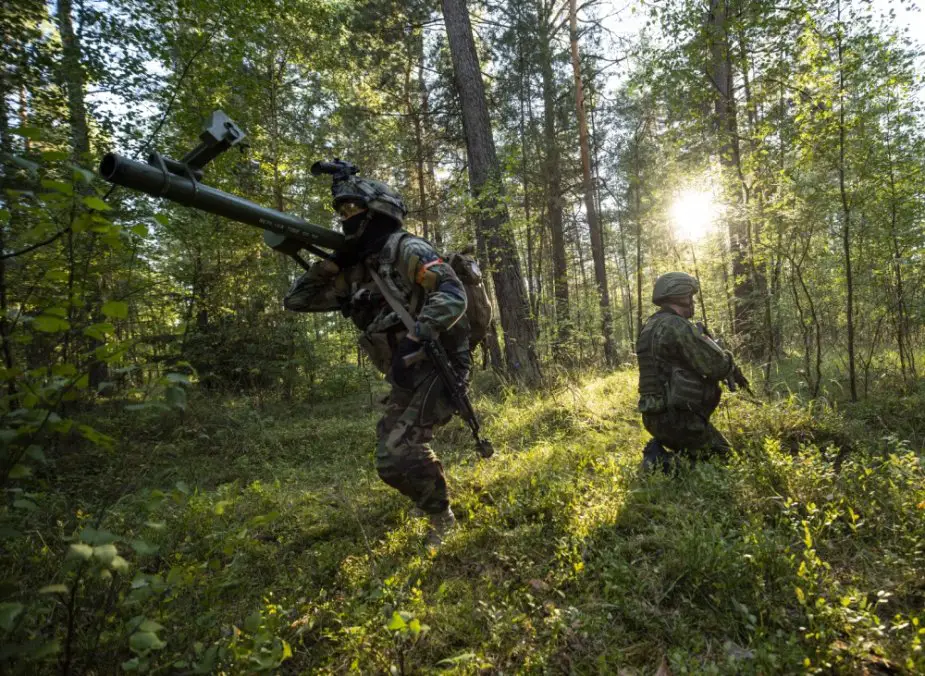Saber Junction 2018 integrated NATO, partner SOF with conventional forces
Exercise Saber Junction 18 combined NATO and partner special operations forces with conventional forces for training at the Joint Multinational Readiness Center, Sept. 3 through Oct. 1. It was an exercise designed to assess the readiness of the U.S. Army’s 173rd Airborne Brigade to execute land operations in a joint, combined environment and promote interoperability with participating Allied and partner nations.

A Special Operations Forces soldier from the Republic of Moldova and a member of the Lithuanian National Defence Volunteer Forces (KASP) provide security during a raid as part of exercise Saber Junction 18 at the Grafenwoehr Training Area, Germany, September 27, 2018. SOF worked alongside the KASP during Saber Junction 18 to conduct irregular warfare in enemy occupied territory to support the U.S. Army’s 173rd Airborne Brigade as they executed land operations in a multinational joint environment. (Picture source : U.S. Army / 1st Lt. Benjamin Haulenbeek)
As part of the exercise, Special Operations Forces from Albania, Bulgaria, Greece, Montenegro, Moldova and the U.S. Army 20th Special Forces Group (Airborne) partnered alongside Lithuania’s National Defence Volunteer Force, or KASP, to conduct irregular warfare in enemy occupied territory to set conditions on the battlefield for conventional forces. "Integration between SOF and [conventional forces] is critical,” said U.S. Army Maj. David Ahern, Executive Officer of the 173rd Airborne Brigade, also known as the ‘Sky Soldiers.’
The Sky Soldiers’ executive officer added that by ensuring reliable communications and creating a common picture of the operation, they collectively became more lethal and agile. “We are each able to focus on our unique skills while working towards complimentary ends,” said Ahern. “The value of training this way at JMRC is that we achieve this interoperability with U.S. and allied SOF in an incredibly realistic training environment.”
An important task for SOF in supporting conventional forces occurred early in the exercise. Greek Special Operations Forces supported a tactical airborne operation conducted by a long-range reconnaissance platoon from Italy’s Folgore Airborne Brigade. “Exercise Saber Junction 18 provides realistic problem sets in scenarios allowing our special operations forces to apply their skills in unorthodox ways,” said a Greek Special Operations Forces Captain.
Greek SOF were the first to fight against JMRC’s assigned opposing forces battalion, the U.S. Army’s 1st Battalion, 4th Infantry Regiment. “Our platoon held back the opposing forces in order to secure a landing zone,” he said.
The 20th SFG(A) and KASP also secured drop zones and landing zones to facilitate approximately 900 173rd Airborne Brigade paratroopers airborne assault into the training area. “Collectively we are preparing as a force to support a joint forcible entry by conventional forces,” said a 20th SFG(A) team sergeant. “For Saber Junction 18, we are supporting 173rd Airborne Brigade’s paratroopers as they conduct air assault operations.”
To effectively support conventional forces operations a great deal of planning and coordination must occur. Albanian and Bulgarian Special Operations Forces shared responsibility as the special operations task group, the higher headquarters responsible for coordinating and directing special operations task units, the small individual SOF teams in the exercise.
“Our responsibility as the special operations task group and headquarters support is setting up common ground to integrate with other SOF operators and interoperate with a conventional force on a brigade level,” said an Albanian Army Special Operations Forces Sergeant Major. “In order to succeed in a real battlefield situation, it is here at the Saber Junction 2018 exercise we learn alternative standard operating procedures and other tactical techniques.”
The Saber Junction 18 exercise ensured all SOF units met objectives relevant to their real-world combat tasks. The missions included special reconnaissance, military assistance, personnel recovery and direct action. NATO and partner SOF experienced the full-spectrum of warfighting functions to ensure combat readiness. “There is exceptional value in developing better habits from the repetitive execution of training,” said a Moldovan SOF captain. “This training will help save lives when we are down range during an actual conflict.”
SOF units participating in training exercises at JMRC are supported by a team of SOF observer, coach and trainers. “The SOF and KASP are individually and collectively better prepared for combat,” said the U.S. Army Special Forces officer in charge of JMRC’s Special Operations Forces Cell. “These units are returning to their country and native units with beneficial lessons learned for home station training.”


























